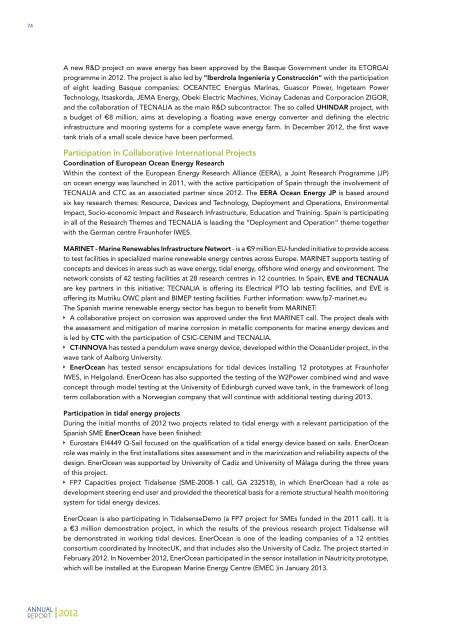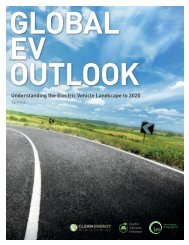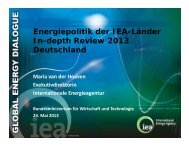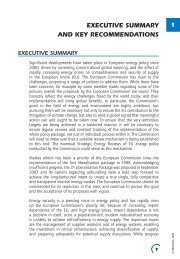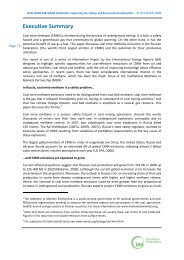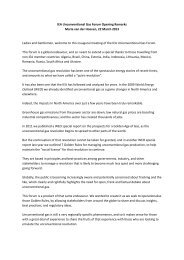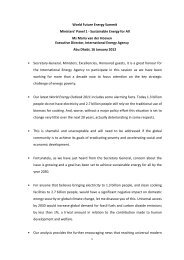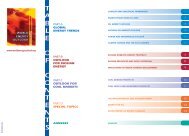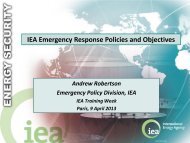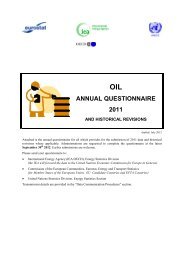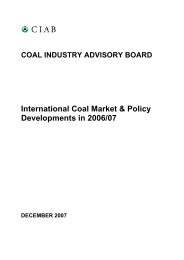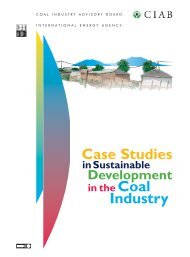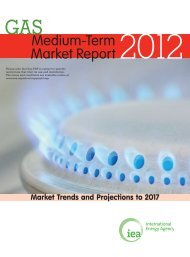OES Annual Report 2012 - Ocean Energy Systems
OES Annual Report 2012 - Ocean Energy Systems
OES Annual Report 2012 - Ocean Energy Systems
Create successful ePaper yourself
Turn your PDF publications into a flip-book with our unique Google optimized e-Paper software.
74<br />
A new R&D project on wave energy has been approved by the Basque Government under its ETORGAI<br />
programme in <strong>2012</strong>. The project is also led by “Iberdrola Ingeniería y Construcción” with the participation<br />
of eight leading Basque companies: OCEANTEC Energias Marinas, Guascor Power, Ingeteam Power<br />
Technology, Itsaskorda, JEMA <strong>Energy</strong>, Obeki Electric Machines, Vicinay Cadenas and Corporacion ZIGOR,<br />
and the collaboration of TECNALIA as the main R&D subcontractor. The so called UHINDAR project, with<br />
a budget of €8 million, aims at developing a floating wave energy converter and defining the electric<br />
infrastructure and mooring systems for a complete wave energy farm. In December <strong>2012</strong>, the first wave<br />
tank trials of a small scale device have been performed.<br />
Participation in Collaborative International Projects<br />
Coordination of European <strong>Ocean</strong> <strong>Energy</strong> Research<br />
Within the context of the European <strong>Energy</strong> Research Alliance (EERA), a Joint Research Programme (JP)<br />
on ocean energy was launched in 2011, with the active participation of Spain through the involvement of<br />
TECNALIA and CTC as an associated partner since <strong>2012</strong>. The EERA <strong>Ocean</strong> <strong>Energy</strong> JP is based around<br />
six key research themes: Resource, Devices and Technology, Deployment and Operations, Environmental<br />
Impact, Socio-economic Impact and Research Infrastructure, Education and Training. Spain is participating<br />
in all of the Research Themes and TECNALIA is leading the “Deployment and Operation” theme together<br />
with the German centre Fraunhofer IWES.<br />
MARINET - Marine Renewables Infrastructure Networt - is a €9 million EU-funded initiative to provide access<br />
to test facilities in specialized marine renewable energy centres across Europe. MARINET supports testing of<br />
concepts and devices in areas such as wave energy, tidal energy, offshore wind energy and environment. The<br />
network consists of 42 testing facilities at 28 research centres in 12 countries. In Spain, EVE and TECNALIA<br />
are key partners in this initiative: TECNALIA is offering its Electrical PTO lab testing facilities, and EVE is<br />
offering its Mutriku OWC plant and BIMEP testing facilities. Further information: www.fp7-marinet.eu<br />
The Spanish marine renewable energy sector has begun to benefit from MARINET:<br />
ÌÌ<br />
A collaborative project on corrosion was approved under the first MARINET call. The project deals with<br />
the assessment and mitigation of marine corrosion in metallic components for marine energy devices and<br />
is led by CTC with the participation of CSIC-CENIM and TECNALIA.<br />
ÌÌ<br />
CT-INNOVA has tested a pendulum wave energy device, developed within the <strong>Ocean</strong>Lider project, in the<br />
wave tank of Aalborg University.<br />
ÌÌ<br />
Ener<strong>Ocean</strong> has tested sensor encapsulations for tidal devices installing 12 prototypes at Fraunhofer<br />
IWES, in Helgoland. Ener<strong>Ocean</strong> has also supported the testing of the W2Power combined wind and wave<br />
concept through model testing at the University of Edinburgh curved wave tank, in the framework of long<br />
term collaboration with a Norwegian company that will continue with additional testing during 2013.<br />
Participation in tidal energy projects<br />
During the initial months of <strong>2012</strong> two projects related to tidal energy with a relevant participation of the<br />
Spanish SME Ener<strong>Ocean</strong> have been finished:<br />
ÌÌ<br />
Eurostars E!4449 Q-Sail focused on the qualification of a tidal energy device based on sails. Ener<strong>Ocean</strong><br />
role was mainly in the first installations sites assessment and in the marinization and reliability aspects of the<br />
design. Ener<strong>Ocean</strong> was supported by University of Cadiz and University of Málaga during the three years<br />
of this project.<br />
ÌÌ<br />
FP7 Capacities project Tidalsense (SME-2008-1 call, GA 232518), in which Ener<strong>Ocean</strong> had a role as<br />
development steering end user and provided the theoretical basis for a remote structural health monitoring<br />
system for tidal energy devices.<br />
Ener<strong>Ocean</strong> is also participating in TidalsenseDemo (a FP7 project for SMEs funded in the 2011 call). It is<br />
a €3 million demonstration project, in which the results of the previous research project Tidalsense will<br />
be demonstrated in working tidal devices. Ener<strong>Ocean</strong> is one of the leading companies of a 12 entities<br />
consortium coordinated by InnotecUK, and that includes also the University of Cadiz. The project started in<br />
February <strong>2012</strong>. In November <strong>2012</strong>, Ener<strong>Ocean</strong> participated in the sensor installation in Nautricity prototype,<br />
which will be installed at the European Marine <strong>Energy</strong> Centre (EMEC )in January 2013.<br />
ANNUAL<br />
REPORT <strong>2012</strong>


